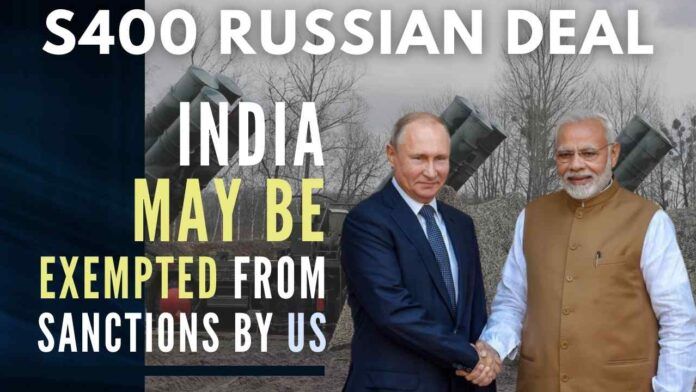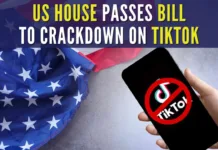
US discourages India from acquiring Russian S400 missile defence systems: Biden’s nominee
Considering India’s importance for the US in the Indo-Pacific region to counter the Chinese aggression, the US has hinted that India may be spared sanctions for buying the S400 Triumf anti-missile defence system from Russia.
The US President Joe Biden‘s nominee to be the top official dealing with sanctions said that India could be spared from the sanctions.
Countering America’s Adversaries Through Sanctions Act (CAATSA) is the act under which the US puts sanctions against countries buying Russian defence equipment.
James O’Brien, the nominee for Coordinator for Sanctions Policy, said on Wednesday that in considering sanctions on India, “there are important geostrategic considerations, particularly with the relationship to China” and “so, I think, we have to look at what the balance is.”
O’Brien was asked about sanctioning India under the CAATSA by Senator Todd Young when O’Brien appeared before the Senate Foreign Relations Committee for his confirmation hearing.
Young noted that Washington has imposed sanctions on Turkey’s defence establishments for buying the S400 system and asked if that provided “any warning or lessons for how to proceed with India.”
“I believe they’re very different circumstances and of course different security partnerships,” he added.
O’Brien said: “As you say, I think it’s difficult to compare the two situations, one with a NATO ally (Turkey) that is breaking with legacy defence procurement systems, and then it is India, a partner of growing importance, but that has legacy relationships with Russia.”
“The administration made clear that it is discouraging India from proceeding with the acquisition of Russian equipment,” he said, but added that there were “important geostrategic considerations.”
“It’d be premature to say more, but this is something I look forward to working with with you and other interested members,” he said.
Young said that India importing the S400 system has “led some of my colleagues to call for sanctions under CAATSA” but declared that he was against taking action against New Delhi.
“India’s vital ally in our competition against China, and that’s why I believe we should resist taking any actions that might drive them away from us and the QUAD. I’m therefore strongly supportive of waiving CAATSA sanctions against India, given our shared foreign policy interests.”
India, along with the US, Japan, and Australia, is a member of the four-nation group that is known as the QUAD, which is emerging as a key component in Washington’s strategy against China’s growing aggressive posture in the Indo-Pacific region.
“Indians have a lot of legacy systems from previous decades and they are interoperable with the Russians systems and the Indians seek to defend their land border from Chinese incursions and defend the Indian Ocean from an increasingly adventurous and lawless blue ocean (Chinese) Navy and the People’s Liberation Army,” Young said.
The S400 system and navy frigate ships India is acquiring from Russian are both “important systems for the Indians“, he said.
Chuck Schumer, the leader of the majority Democratic Party in the Senate, has previously expressed opposition to waivers while Senate Foreign Relations Committee Chair Bob Menendez has been ambivalent about it.
Young, along with fellow Republican Senators Ted Cruz and Roger Marshall introduced a bill last year to help India evade the CAATSA sanctions.
But the legislation called “Circumspectly Reducing Unintended Consequences Impairing Alliances and Leadership Act of 2021” (CRUCIAL Act) went nowhere in the last Senate session.
It sought to exempt the members of the QUAD from US sanctions for a 10-year period.
Neither Japan nor Australia buys arms from Russia, but adding them to the exemptions list would turn the focus away from India and turn the spotlight on China.
There is also support from the Democratic side for giving India CAATSA exemptions.
Democrat Mark Warner joined Republican John Cornyn in warning Biden that sanctions could have a “deleterious effect on a strategic partnership” between Washington and New Delhi and asked him to waive the action.
The first components of the S400 valued between $4 billion and $5.5 billion are already delivered to India in November by Russia.
Although Russia continues to be the major arms supplier to India, New Delhi is increasing defence purchases from the US as the two countries enter into defence cooperation agreements.
During former President Donald Trump’s visit to India in 2020, he and Prime Minister Narendra Modi announced a $3.5 billion arms deal that would include 24 Sikorsky MH-60R Sea Hawk multi-role helicopters and six Boeing AH-64E Apache Guardian attack helicopters.
[With Inputs from IANS]
PGurus is now on Telegram. Click here to join our channel and stay updated with all the latest news and views
For all the latest updates, download PGurus App.
- ED grills AAP legislator Amanatullah Khan in Delhi Waqf Board case - April 18, 2024
- DRDO successfully flight tests indigenous cruise missile - April 18, 2024
- ED attaches assets worth over Rs.97 cr of Raj Kundra, Shilpa Shetty in Bitcoin scam case - April 18, 2024










